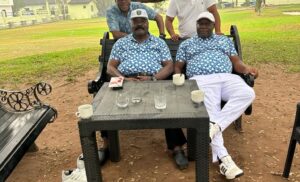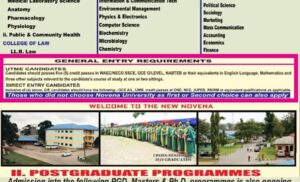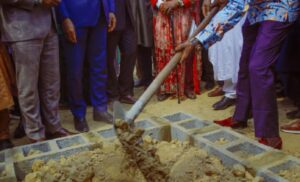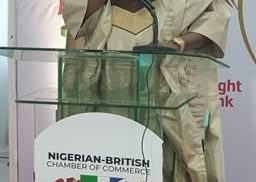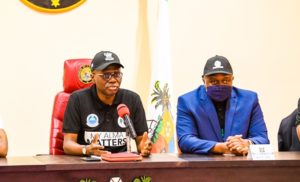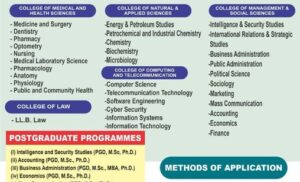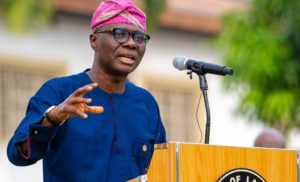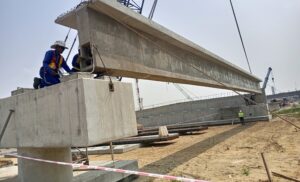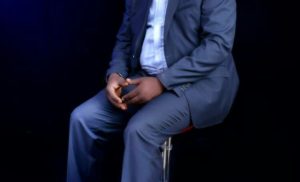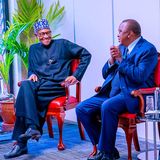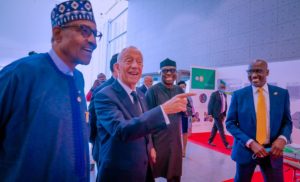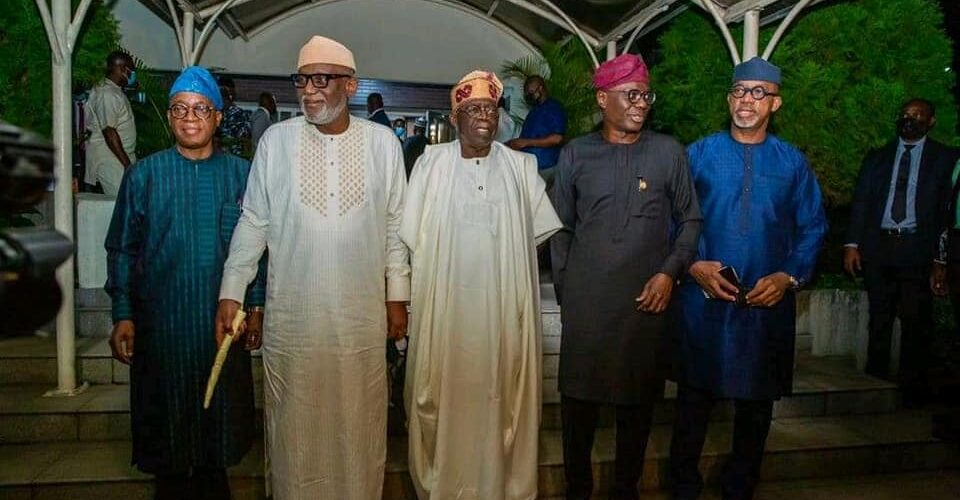
Tinubu’s full speech at Chatham House
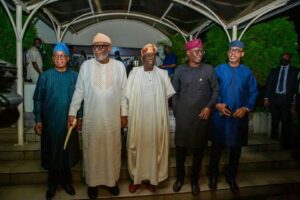
Being Text of an Address Delivered by His Excellency, Ahmed Bola Tinubu, Former Governor of Lagos State and Presidential Candidate of the All Progressives Congress at Chatham House, London, on 05 December, 2022.
Protocols
I would like to begin by expressing my delight at being here once again to share my thoughts with this distinguished audience.
The last time I was here in 2013, it was to share my views on the nascent formation of Nigeria’s mega opposition party – the All Progressives Congress[APC]. The party went on to win a historic victory against the ruling PDP in February 2015 and has been in office for almost eight years. Over the years – Chatham House – has carved a niche for itself and built a reputation as a globally admired and respected platform for intellectual engagement on different issues of contemporary interest to people around the world.
Excellencies, Distinguished Ladies and Gentlemen, it is time again for Nigerians to go to the polls to elect the next set of leaders.
The national elections which will take place in the first quarter of 2023 can be considered as especially significant in Nigeria’s quest for democratic consolidation. The 2023 elections will be taking place on the back of almost 25 years of unbroken civilian rule. It is a record for the country which is worth entrenching and celebrating.
Every election, wherever it is held, is important to the people or entity directly concerned. It is also important to the global democracy community as well. Equally, there are also countries whose elections, on account of their weight and influence, carry wider implications way beyond their immediate geographical boundaries. Nigeria is one of such countries.
One area wherein the government of the All Progressives Congress (APC) has distinguished itself is election management. Today’s elections are more credible than ever since the return to democracy in 1999. Recent statutory enactments allowing the use of technology tools for the accreditation of voters and transmission of results will, deliver the freest and fairest election in our nation’s history. This is particularly important because the next president of Nigeria will have some tough choices to make and will not be able to do so with a questionable electoral mandate.
Ballot security and election violence are areas where there is still cause for concern. There is an emerging trend of attacks against the personnel and infrastructure of the Independent National Electoral Commission (INEC) in parts of the country. At the same time, political conversations on social media have become more laced with violent rhetoric and threats of violent retaliation against those perceived to be opposing partisans.
I stand firmly against all forms of electoral violence and intimidation. Having spent most of my career in the political opposition, I have long fought against electoral malpractice and any attempts to extinguish the legitimate choice of voters. I will continue to do so.
And I urge all my fellow contestants in this election to do the same. Let the sovereign will of the people decide the path of our nation. And let this election be determined by voters making their choice freely rather than the domineering intimidation of the troublesome few.
Indeed, there is more than a passing interest in Nigerian politics generally and the upcoming elections in particular for several reasons.
For one, as Africa’s most populous country and the continent’s largest economy, it is generally acknowledged that the fortunes of the African continent and indeed the Black race is tied directly to the health of Nigeria.
Also the Nigerian elections of 2023 are coming up at a time when the country’s immediate geographical neighbourhood of West and Central Africa is undergoing serious political turmoil that has manifested itself in the incursion of the military to power in a number of countries. In spite of the legitimate concerns being expressed by observers, Nigerians are resolutely committed to democracy, regardless of their political differences.
At the best of times, and with reference to its foreign policy orientation since independence in 1960, and since the end of its civil war in 1970, Nigeria has always crafted its domestic national security and economic development policies with some strategic foreign policy imperatives in mind. There is a close connection between domestic development and national security. On the one hand, to prosper at home in peace and stability, Nigeria needs to uphold its national security, unity, territorial integrity, sovereign independence, and the safety and well-being of its peoples.
On the other hand, to secure itself, Nigeria not only requires to build and enhance the capacity of its armed forces but also the welfare and wellbeing of its citizens. Through a commitment to the promotion of human security, the country has attempted through successive governments to interface national security and economic development as two sides of the same coin – focusing equally on food sufficiency and sustainable development.
Nigeria shares direct land borders with four sister African countries with whose peoples Nigerians also share historical and cultural affinities.
This effectively means that the relationship between Nigeria and its immediate neighbours is much more than just a geographical expression.
To be fully secure at home, Nigeria has always believed it must be the brothers’ keeper. It was out of this understanding that Africa’s premier regional economic community, ECOWAS, was established in 1975. Uniquely, ECOWAS had embedded in its mandate, the promotion of regional economic integration as a good in its own right and in addition undertook sub-regional peace and security.
I am convinced, as I am sure most of us are, that the broad principles that enabled successive Nigerian governments to interface development and security, and establish an organic link between national security and economic development with regional peace and prosperity is both impeccable and remains relevant. It is an approach which I commit myself to upholding and advancing.
The challenges which have manifested themselves with regard to our national and regional development and security trajectories are very well-known to all of us here:
radical extremist violence, terrorism, banditry, kidnapping, human trafficking, trafficking in weapons, trafficking in drugs, climate change and resource driven conflicts etc. Mostly manifesting initially as national problems, these challenges evolved over time into trans-border and multinational challenges.
As a people, we are still counting the costs of the challenges which different armed and criminal groups are posing to national and regional development. We know that thousands of lives have been lost and continue to be wasted. We know that various infrastructure assets built at huge costs have been destroyed in deliberate acts of reckless vandalism.
We see the thousands of people who have been internally displaced at home or forced into refugee camps abroad. With farming activities disrupted, we have seen shortages of basic food items and food price inflation that are further undermining human security.
I can go on and on in enumerating the costs that have been and are still being inflicted on the mass of the people by the crisis of insecurity. To respond meaningfully to the discontents and to redress the many dislocations arising from them, we must begin by reminding ourselves of that old dictum: Foreign policy is but a continuation of domestic policy.
As a first step, we must recalibrate domestic policy in order to revamp the foundation on which our quest to pursue human security rests.
At one level, this will mean the pursuit with renewed vigour of growth-promoting, employment-creating, and poverty-eradicating policies at home as outlined in my Renewed Hope 2023: Action Plan for a Better Nigeria that I recently released to the Nigerian public.
The present administration has invested heavily in agriculture, providing loans and expanding the country’s total acreage of cultivated land. We will build on this, but our focus will be on using technology and expertise to accelerate growth and development by providing the critical infrastructure necessary to achieve the commodity transformations in the agriculture value chain.
Roads, rail, access to ports, and storage infrastructure are what we require to radically transform the agriculture sector and increase its value to the nation.
Providing these will be the areas of our focus so that the full potential of our agro economy can be achieved, and we can reap the benefits in jobs, improved economic opportunities and increased prosperity.
Fixing the perennial riddle of energy supply is another priority. There is no version of the world where Nigeria’s ambitions for itself can be achieved without solving the problem of how to provide energy to homes and businesses across the country. It is time to recognise that the centralised approach to energy policy and infrastructure is not an optimal arrangement and is unlikely to improve by mere tinkering around the sides.
The Federal government as regulator and operator, and price fixer is a broken model and one that we fully intend to fix if elected.
We have privatised power distribution in Nigeria and generation to a certain degree. What we need to do, going forward, is to improve the enabling environment and further reform the legal and regulatory framework to attract more private investments in the sector as we have experienced in the telecom industry.
My belief that the private sector is the fulcrum of economic progress is evident and documented. However, fundamental flaws with the basic design of our national economy imperil the private sector from playing the role it ought to and adding the value it is capable of. In this instance, the government must act as a catalyst. We shall do this on all fronts. We will address the conflict between monetary and fiscal policies. Budgeting will be based on the projected spending levels needed to push real annual growth rate above 7 per cent while reducing the unemployment rate so that we can double the economy in ten years.
At another level, we must learn to make foreign policy work better for our domestic social, economic and political priorities. To do so, our foreign policy apparatus will need to be retooled to take full advantage of global initiatives and processes that work for us and tally with our domestic priorities. In this instance, I applaud the outcome of COP 27 that recently ended in Egypt, in acknowledging the legitimate claims of the Global South on climate action. In accepting adaptation and energy transition principles, including the treatment of gas as a transition fuel, we will work more on accelerated investment in gas production and we are committed to enhancing domestic and global energy security.
Furthermore, beyond what we do nationally, we must also become much bolder as Africans in our efforts at regional and continental integration and security. In this regard, we are fully committed to the Africa Union’s 2063.
Amidst the changes taking place in global order, the primary duty of leadership in Nigeria – and, I dare say, all of Africa – is how within a vision of national development that is transformative and a strategy of national security that is human-centred, foreign policy is crafted, shared to fit and feed national priorities of rebirth and accelerated progress.
This is the task to which my colleagues and I have committed ourselves as part of a broader project of leveraging our national assets and natural endowments to nurture and project a renewed Nigeria that will be a responsible and respected driver of prosperity and harmony in Africa and around the world.
I am confident that the Nigerian people will go to the polls in a few short months and give me their mandate to lead and govern my beloved country. I will return here to interact with you when the elections are over.
I will come, not with a long list of promises for the future, but with a plan for collaboration in the best interests of the country I love and have dedicated my life to. I hope you will receive me then as graciously as you have today.
WIKE CONFERS STATE HONOURS ON 162 DISTINGUISHED NIGERIANS
*I have no apologies for commending Buhari over 13 percent derivation arrears
Governor Nyesom Ezenwo Wike has honoured 162 distinguished Nigerians for their inspirational achievements, impactful life and contributions to the progress of the State in particular and the nation in general.
Among those honoured are eight State governors, nine former governors of other States, lawyers and others who have demonstrated a high level of loyalty to the nation, excellence in public service, commitment to equity, equality and justice in the country and love for the Government and the people of Rivers State.
Governor Wike presented the awards to the awardees during the State Honours and Awards ceremony 2022 which held at the Banquet Hall, Government House, Port Harcourt on Saturday night.
The award were in four categories, namely: the Grand Service stat of Rivers State (GSSRS), the Distinguished Service State of Rivers State (DSSRS), the Governor’s Medal of Service (GMS) and the Rivers State Merit Award (RSMA).
Those conferred with Rivers’ most prestigious award, the Grand Service Star of Rivers State (GSSRS) are governors Samuel Ortom (Benue), Seyi Makinde (Oyo), Dr. Okezie Ikpeazu (Abia), Ifeanyi Ugwuanyi (Enugu), Bala Mohammed (Bauchi), Yahaya Bello (Kogi), Ahmadu Umaru Fintiri (Adamawa) and David Umahi (Ebonyi).
Others include former governors, Olabode George, Jonah Jang, Donald Duke, Ayodele Fayose, Ibrahim Idris, Olusegun Mimiko, Theodore Orji, Dr Ibrahim Dankwanbo and Adams Oshiomhole.
110 distinguished personalities were conferred with the Distinguished Service State of Rivers State (DSSRS), they include wives of the governors of Rivers and Oyo, Hon. Justice Eberechi Suzzette Nyesom-Wike and Mrs. Tamunominini Makinde; Mrs. Onari Donald Duke, Attorney General of the Federation and Minister of Justice, Abubakar Malami, SAN.
Rivers State Chief Judge, Hon. Justice Simeon Amadi, Rivers State Attorney General and Commissioner for Justice, Zacchaeus Adangor, SAN; Senator Olaka Nwogu, Sir Siminilayi Fubara, Prof. Ngozi Odu, Chief Dan Orbih , His Majesty, Dr. Dandeson Douglas Jaja, Prof. Jerry Gana, Emmauel Ukala, SAN, Chief Nnaemeka Ngige, SAN, Prof. Isa Hayatu Chiroma, SAN among others.
similarly, 33 personalities were presented with the Governor’s Medal of Service (GMS), and two others, Mr. Oruwuru Pere Shedrack and Mrs. Patience Nwogu, with the Rivers State Merit Award (RSMA).
In his remarks, governor Wike, who explained that the State honours and awards was solely the initiative of former governor, Dr. Peter Odili, remarked that everyone bestowed with an award on Saturday night had distinguished themselves by their good character, personal achievements and positive contributions to society.
The governor stated that the eight governors and former governors honoured by the State were selected from different political parties because of their love for the growth and development of Rivers State.
He said: “I want to say to all of you that, Ortom, Seyi, Ugwuanyi, Ikpeazu, Fintiri (you are not with us, you are with your uncle), in terms of principle, these young men are the people you can trust any day any time.
“Bala Mohammed is a G-1, on his own, one man riot squad. But you can trust him. Fintiri, is my friend, he is our friend. It doesn’t matter the differences. He wants his brother to be president. But we still keep our relationship and that is the way it is supposed to be.
“I fought Umahi to the last. He never slept. But I don’t know how God is trying to help him. Most of you remember I was the one who fought Oshiomhole. Sorry that I fought you. Until you get information you have never had before, Oshio Baba sorry. But I did it for the interest of my party.”
The governor said the honours advisory committee had nominated an array of Senior Advocates of Nigeria who have been at the forefront of Rivers State numerous legal battles with the federal government and other states.
He said their professional services, sacrifice and contributions were central to the State government successes in the various courts and the consequential economic benefits Rivers people now enjoy.
The governor said he would refrain from naming the lawyers and commending them publicly because similar gesture extended to President Muhammadu Buhari had elicited unwarranted acrimony in the Niger Delta.
He said: “Human beings instead of them to say I appreciate you, they become envious. Because I say Buhari thank you, I am having problems today. That is the country we are in. I am not a fan of Buhari.
“When a man has done well say he has done well in this area. If he has not done well you say so. I have no apologies to anybody. If Buhari did not release the money from 1999 which my party did not even release, I wouldn’t have been doing what I am doing. I say it and I don’t give a damn to anybody. I don’t care.
“I got the money, I am not a fan of Buhari. He has not done well in many areas, but this one he has done well. My party members may not be happy. But they should not be angry, because this one, he did well.
“He gave me money and I used the money to do something for people in Rivers State. This money was there. Nobody paid us. I hear somebody saying that his three kilometre road would do my 15 flyovers. No problem. Do the three kilometres first. Tell Nigerians you are doing three kilometres.”
The governor said he has advised governors of Ebonyi and Kogi States not to waste their money in supporting any governorship candidate in the State, because the Peoples Democratic Party, PDP, will win all elective positions in the 2023 general elections.
“In my state we know who is going to be our successor. I want to advise you, if you’re spending money on anybody stop. Here we have a successor. It is not by my power, but it is by what we have done in this state. It’s not that I want to impose a successor. It is not true.”
The Benue State governor, Samuel Ortom, who spoke on behalf of his colleagues, said governor Wike has demonstrated that he is a true patriot and nationalist by honouring Nigerians from the six geopolitical zones, irrespective of their religious and political persuasion.
“Today, in Nigeria as we match towards 2023, we are not looking at political parties, we are not looking at ethnicity, but we are looking at how we can salvage our country Nigeria, and make it greater than where we are today. I thank you (Wike) for charting this course and I believe that moving forward from here, that all of us who are here tonight will be a catalyst to how we can make Nigeria greater, economically, politically, socially, security wise, we will make it greater.”
Similarly, the Attorney General of the Federation and Minister of Justice, Abubakar Malami, SAN, who spoke on behalf of the awardees, said governor Wike has taken governance to the next level.
“You have indeed demonstrated what it takes to be accommodative, what it takes to be a bridge builder, a builder of bridges across the Niger. You have established a bridge, we are happy crossing over to come around for the purpose of identifying with you in the expression of excellence attributed to the service of the nation, Rivers state.”
Chairman of the Rivers State Honours advisory committee, Chief Ferdinand Alabraba said the law empowers the governor to confer honour on those who have contributed to the growth and development of the State.
December 4, 2022.
